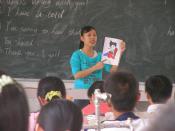Critically review a chapter of your choice from Fisher (1995) Teaching Children to Learn in relation to school experience:
Chapter 8 - Coaching.
I have chosen to critically analyse Fisher chapter 8 on cognitive coaching. When reading through the book this chapter instantly interested me, I wanted to learn more about children's unique learning styles and the strategies we can introduce to enhance their learning. I will be looking into four fields of learning styles and investigated Fisher's six strategies within cognitive coaching and evaluating these.
In the beginning of this chapter Fisher explains how 'thinking and learning is an idiosyncratic process'. We all have individual learning styles unique to us. Many psychologists agree with Fisher and recognise the different learning methods:
'In many of his works, Piaget takes pains to point out that there exist individual differences in children's rate of attainment of the various cognitive structures.' (New directions in educational psychology: edited by Noel Entwistle)
All these styles need to be taken into account when teaching children we therefore need to understand them.
In 'Reflective teaching in the primary school: a handbook for the classroom' by Andrew Pollard and Sarah Tann who describe the different styles of learning:
Holist/serialist (Pask, 1976; Kagan and Kagan, 1970): Holists get a quick grasp of information then fill in the detail. Where as serialists build up a picture bit by bit.
Field-dependent/ field-independent (Witkin et al., 1977): Field dependent learners use general context or their experience to solve problems and Field-independent learners analyse a stimulus, identify an manipulate a problems components.
Scanners/Focusers (Bruner et al., 1956): Scanners make an initial hypothesis and see if everything fits where as Focusers chose component variables and test each one then get a theory.
Divergent/convergent (Torrance 1962): Divergent learners use their inspirational flair...


